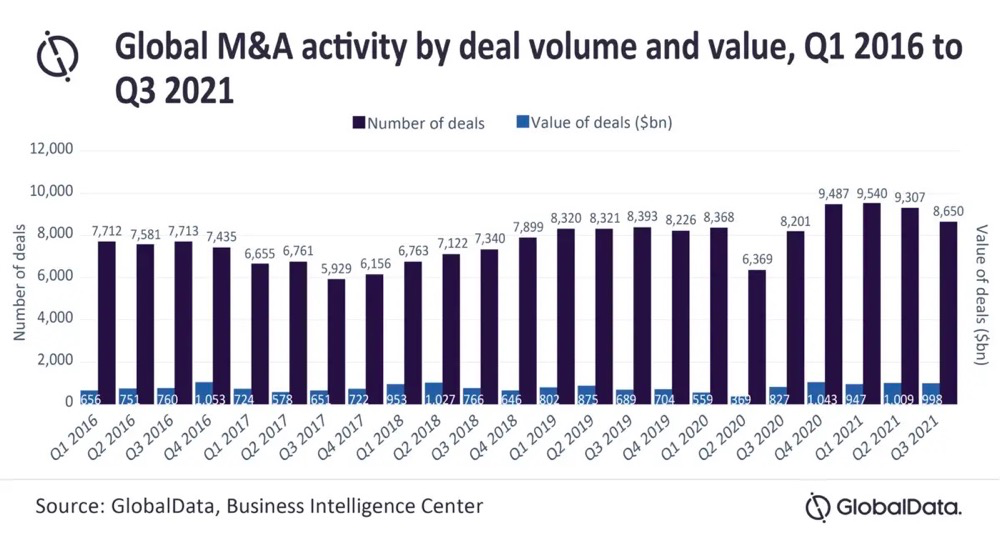Inventory: Top 10 tech M&A deals in 2022

Inventory: Top 10 tech M&A deals in 2022

According to Global Data research, as of the third quarter, global technology M&A transactions have approached $3 trillion, mainly supported by the technology, media and telecommunications industries.

Despite the economic uncertainty in 2022, the pace of blockbuster mergers and acquisitions in the IT industry does not appear to be slowing down. Here are tech mergers and acquisitions announced, completed, or still in progress as of the end of the year:
1. Microsoft to buy Activision Blizzard for $68.7 billion

On January 18, 2022, Microsoft announced its intention to acquire gaming giant Activision Blizzard for $68.7 billion in cash. But because of the size of the acquisition, the deal is being reviewed by several government business agencies for antitrust issues and subject to regulatory and shareholder approval.
In the long run, Microsoft's acquisition of Activision Blizzard at a sky-high price is to seize the wind of the metaverse.
At present, the industry is considering the game, a product with a highly immersive experience and a high degree of integration of art, technology, and culture, as the only way to open the Metaverse. Nadella, CEO and chairman of Microsoft, also said: Games are a key element to the Metaverse.
After the completion of this acquisition, Microsoft will further strengthen its content layout in its existing hardware, content, and cloud computing layout. If the acquisition can be successfully completed with regulatory approval, Microsoft will surpass NetEase and Nintendo in one fell swoop and become the third largest game company in the world after Tencent and Sony.
As of December 2022, the FTC has formally opposed the action. So far, Saudi Arabia, Brazil and Serbia have approved the acquisition of Microsoft with zero regulatory benefits. If approved by international regulators, Microsoft would own Activision, Blizzard Entertainment and King under the Xbox Game Studios banner.
2. Broadcom acquires VMWare for $61 billion

Chipmaker Broadcom acquired virtualization technology leader VMware in a cash-and-stock deal worth about $61 billion in May.
Best known for its chip business, Broadcom designs and manufactures semiconductors for modem, Wi-Fi and Bluetooth chips across a variety of devices. The acquisition of VMware is aimed at boosting Broadcom's software business.
VMware, which specializes in cloud computing and virtualization technologies, was owned by Dell until it was spun off last year. Following the acquisition, Broadcom Software Group changed its name to VMware Operations, integrating Broadcom's existing infrastructure and security software solutions as part of the expanded VMware portfolio.
3. AMD acquires Xilinx for $49 billion

On Feb. 14, chip giant AMD said it had completed its $49 billion acquisition of Xilinx, the semiconductor company credited with inventing the first commercially viable field-programmable gate array (FPGA) and creating the first fabless manufacturing model is known.
The acquisition marks the largest chip deal in history. The price tag for the all-stock deal is $49 billion, well above the $35 billion originally proposed when the deal was first announced in October 2020.
Through this acquisition, AMD aims to enrich its own product line and form a complete high-performance computing system with existing CPU processors, GPU graphics cards, and accelerated computing cards. In the future, AMD is very likely to increase the integration of Xilinx FPGA IP in CPU and GPU, so as to compete more targetedly with Intel and NVIDIA.
On the contrary, Nvidia, another AMD competitor, gave up on the $66 billion acquisition of Arm.
Arm's sale has come under scrutiny because its chips are designed for use in everything from phones to cars to factory equipment, making neutrality fundamental to its business model. The world's largest tech companies, which rely on Arm's technology, fear that under Nvidia's leadership tech companies could lose unfettered access.
4. Elon Musk buys Twitter for $44 billion

As one of the most controversial technology deals this year, the world's richest man, Elon Musk, began buying shares in social media platform Twitter in early 2022 and became the company's largest shareholder with a 9.1% stake in April. That forced him to offer to buy the platform for $44 billion.
While Twitter's board initially resisted hostile takeovers with a "poison pill" tactic, they unanimously accepted Musk's takeover offer in April, and Musk has since suggested introducing new features to the platform, making its algorithms open-source, and cracking down on bot accounts. and promote freedom of expression.
In July, Musk announced his intention to terminate the agreement, claiming that Twitter violated their agreement by refusing to crack down on fake accounts. Twitter filed a lawsuit against Musk shortly thereafter, and a few weeks before the trial began, Musk changed his mind and announced he would move forward with the acquisition.
The acquisition was completed on October 27, with Musk immediately becoming Twitter's new owner and CEO, and Twitter was taken private.
Immediately after acquiring Twitter, Musk fired several top executives, including former CEO Parag Agrawal. Musk has since proposed several changes to Twitter and fired half of the company's workforce. Hundreds of employees subsequently resigned from the company after Musk issued an ultimatum asking them to commit to "extremely core" work.
5. Oracle acquires Cerner for $28.3 billion

Oracle acquired health information technology company Cerner through an all-cash tender offer in June for an equity value of approximately $28.3 billion. Cerner is a provider of digital information systems used in hospitals and health systems to provide better healthcare for individual patients and the community.
In a statement, the database giant said it plans to expand the company's global footprint. Additionally, Oracle outlined some worthwhile acquisition targets, including building cloud software systems that allow doctors to spend less time administering and more time with patients.
6. Adobe acquires Figma for $20 billion

Adobe announced the acquisition of online collaborative design software company Figma for $20 billion, Adobe's largest acquisition to date.
“The combination of Adobe and Figma is transformative and will accelerate our vision of collaborative creativity,” Adobe Shantanu Narayen, chairman and CEO, said in a statement.
Figma is a strong competitor to Adobe with its real-time collaboration and rapid prototyping capabilities. The company has more than 4 million customers, including Airbnb, BP, Kimberly-Clark, Microsoft and Salesforce, among others.
Analysts believe that the deal is of great significance to Adobe, because in the long run, the acquisition will bring additional sales and further growth to the company.
7. Microsoft acquires conversational AI company Nuance for $19.7 billion

On March 4, Microsoft completed the acquisition of Nuance Communications, a developer of conversational artificial intelligence and ambient intelligence technology with applications across industries including healthcare, financial services, retail and telecommunications.
Microsoft first announced the $19.7 billion acquisition in April 2021. Nuance is a well-known company in the field of speech recognition and the creator of the speech recognition engine for Apple's smart assistant Siri. According to Microsoft's official website, more than 80% of hospitals in Germany and more than 500,000 medical professionals worldwide, as well as 19 of 20 leading financial institutions and 85% of Fortune 100 companies rely on Nuance solutions.
Nuance is now part of Microsoft's Cloud + AI Group, and Nuance technology is being used to develop cloud-based AI solutions around consumer, patient and employee services.
8. Vista Equity Partners to acquire Citrix for $16.5 billion

On January 31, Citrix announced that it would be acquired by Vista Equity Partners and Evergreen Coast Capital in a $16.5 billion all-cash deal.
After acquiring Citrix, the two new owners plan to merge Citrix with enterprise data integration software provider Tibco.
After the merger of the two software vendors, Citrix's digital workplace (that is, virtual desktop) and application delivery can be integrated, as well as Tibco's real-time intelligent data and analysis software, which also includes a number of companies that Tibco has acquired over the past few years. Examples include data automation vendor Scribe, business intelligence vendor Information Builders, and in-memory data platform SnappyData.
9. Intel acquired Tower Semiconductor for $5.4 billion

In February this year, Intel reached a deal to acquire Israeli chipmaker Tower Semiconductor for US$5.4 billion. The company stated that the acquisition aims to promote Intel's IDM2.0 strategy and further expand Intel's manufacturing capacity, global layout and technology portfolio. to meet industry needs.
Founded in 1993, Tower Semiconductor manufactures analog integrated circuits for more than 300 customers worldwide. In addition to gaining more manufacturing capabilities, Intel will gain access to Tower's portfolio of expertise, including radio frequency, power and industrial sensors. Intel will also gain access to Tower's extensive IP and electronic design automation partnership.
The companies expect to complete the acquisition in early 2023.
10. Google acquires cybersecurity firm Mandiant for $5.4 billion

Google completed the acquisition of Mandiant in September. Mandiant, formerly known as FireEye, provides a security detection and response platform as well as detection and management services.
Google Cloud CEO Thomas Kurian said that the company plans to "reinvent security" for customers through this move, and the acquisition of Mandiant significantly expands Google's network security capabilities in real-time threat intelligence and incident response.
Google Cloud stated that the acquisition of Mandiant will strengthen Google Cloud’s existing security services, including Zero Trust Security Solution BeyondCorp Enterprise, Malware Analysis Service VirusTotal, Cloud Computing Native Security Information and Event Management (SIEM) Platform Chronicle, Security Monitoring and Security Management guidance services, etc., allow Google Cloud to provide end-to-end security operation services, so that enterprises can be guaranteed at every stage of the security life cycle.